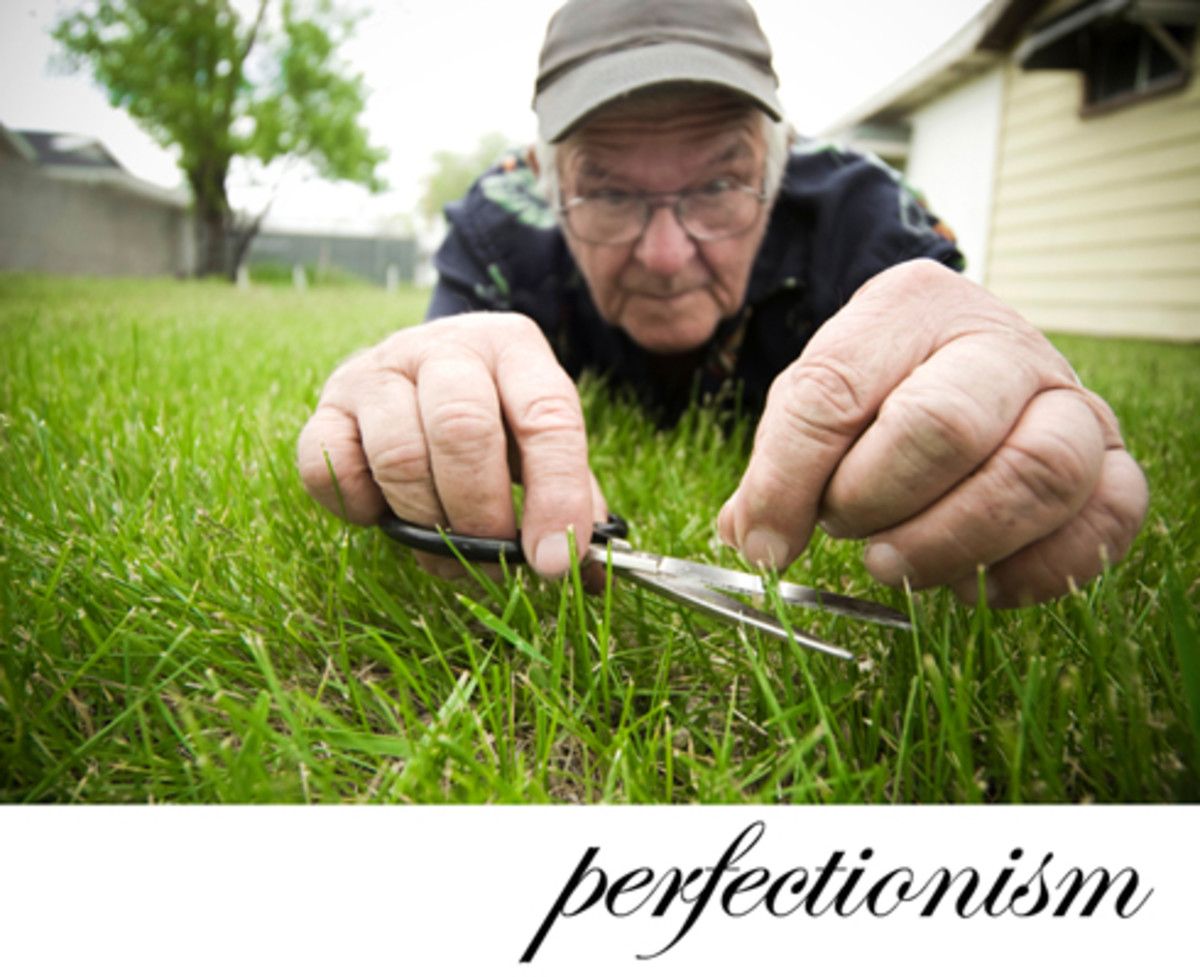The Problem with Seeking Perfection
Everything and ever thing is exactly as it should be.

Welcome to The Problem with Seeking Perfection.
You’ve probably witnessed this sort of thing yourself. I hope you’ve never been guilty of it. A son or a daughter arrives home from school beaming with pride. They’ve just got their exam results: an average of 96%. They’ve topped the whole school. They know they’re brilliant! Walking on ‘Cloud Nine’ they hand their written results to their father. He glances at the paper quickly then says. “What happened to the other four percent?” Can you imagine what that does to a young lad or girl when their father says that?...
Perfectionists cause great suffering.
There are people who are perfectionists. Generally, they cause great suffering wherever they go. This suffering just doesn’t stay with them. They radiate it to all and sundry with whom they identify. “My wife must be a perfect mother. “ “My darling must be the most well-groomed and attractive woman in the room.” “My children must excel. They must be the best. They must outshine and outperform everyone around them – that’ll make me feel good.” It never does, of course. It never does because complete wholeness is always beyond our reach. I’m sure the All Mighty made it that way, if only to keep us moving along, reaching upwards towards that which is always out of reach and was always meant to be.
"A man's reach must always exceed his grasp..."
The old quotation springs to mind, “A man’s reach must always exceed his grasp or what’s a heaven for?” Maybe the words are not exact, but you get the picture. We are never meant to have perfection in our grasp. We reach for it, and that’s good. But no one ever said we need to strain our muscles or put our shoulders out of joint, reaching for it.

Perfectionism always has a downward spiral. It leaves us room only for failure.
I like the insightful analysis of the perfectionist as depicted by John Powell in his book, Happiness is an Inside Job. Powell says: “The difference between one who is healthy (in the mental sense) and the perfectionist is that the healthy person is in control of his or her life. The perfectionist is controlled, is driven by compulsion.” Again: “Perfectionists believe their worth is measured by their performance. Of course, mistakes then detract from their personal worth.” And most insightful of all: “Perfectionism always has a downward spiral. It leaves us room only for failure.”
This obsessive compulsion radiates far and wide.
And as previously said, the perfection is not only about the person who is the perfectionist, it is about everything and everybody who is associated with him. The misery caused by this obsessive compulsion’ radiates far and wide.
How many times have you seen people, children especially, devastated by a chance remark, even a glance of disapproval that has signaled to them that their hero – usually a parent – is disappointed with them. You let them down by running second in the big race. The fact that you ran first in half-a-dozen qualifying races that got you up to that point is completely overlooked. You muffed the high-dive, made too big a splash and didn’t get a place. You were out pointed in the boxing match.
The look of disgust can cut one to the quick.
When I was a lad back in the 1940s competitive boxing was all the rage. Most schools had boxing on their sports curriculum. My father had been a regimental champion boxer in the British Army in the 1930s He encouraged both me and my older brother to go into boxing. He even gave us a few lessons. Well, neither of us had what it takes. After a few losses he gave up on us. The looks were enough. We’d failed him. My dad wasn’t an academic type, so other areas of education held no interest as far as his children’s progress was concerned. He wasn’t a real perfectionist.

Falling short is being human. It's human to make mistakes.
Good thing, too. Because as a student, I was generally somewhere towards the middle of every class I was ever in, and that applied to just about every subject. Apart from English, where I was usually up in the top ten to fifteen percent, I was pretty useless at most of the other subjects. I didn’t consciously feel inferior, but if I ever did think about it, I knew myself to be pretty mediocre.
This obsessive compusion radiates far and wide.
Imagine my surprise then, when in 1949 at a school presentation day, I was summoned up on stage to receive a gift. The gift came in the form of a little book, Black Beauty by Anna Sewell. It was signed by the Head Master and an Education Officer. I received it for ‘General Progress.’ At thirteen it seemed I’d stepped up somewhat. Yep, I still have the book, the date written inside 14/10/49, courtesy of the London County Council. I think I started to make real progress in life when I got away from the idea of being ‘the champion’ or one who is perfect, and just started to enjoy learning for learning’s sake. Reading probably became my salvation. And I’d didn’tg even think of it as learning.
Doing your very best - sounds innocuous enough.
The common saying, “Go out there and give it your best,” might seem innocuous enough. “Do your very best,” might seem to be encouraging. It is. But maybe it does a little more than this. It really depends who’s is saying it; how important we feel it is to that person that we do, do our very best. For if we think that person will be really disappointed, hurt even, if we don’t perform well, we are put under pressure. We are subjected to a stress we’ve built up in our own minds.

We surrender our power when we depend on the approval of others.
A problem here is that we gradually become crowd pleasers at our own expense. We begin to worry about what other people think of us. The fact that other people hardly think of us at all rarely if ever crosses our minds. We became obsessive about “making Dad, or making Mum happy.” Or pleasing our peers. But that gradually moves towards making just about all others around us notice us with approval. We became approval seekers. And the moment we do that we surrendered some of our power to other people. You see, we really have no power over what others think or feel about us.
The need to please others can become a lifetime habit.
This need to please others can quite easily become a lifetime habit. Maybe you fall into this category yourself. Be honest now. If you do, then this Hub might just be the awakening you need. Learn about yourself. Observe yourself. Are you under a self-induced pressure to always perform at your best? Do you feel you’ve let yourself down if you goofed and made a mistake? Well, relax. Why? Because people will recognize you and identify with you. They’ll see you as human. They’re human, too. They make mistakes. We all do. So certainly make the steady effort to improve in any area of your life that you wish to. But don’t expect perfectionism. And certainly don’t expect to be perfect at something first time up. Rather, enjoy the gradual improvement. Enjoy the journey. For that is what life is about.
I hope you got something from The Problem with Perfection – and its identification with 'doing your very best' as an obsessive compulsion. You comments are welcome.
Keep happy...







